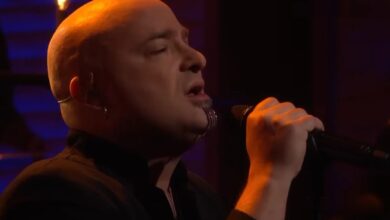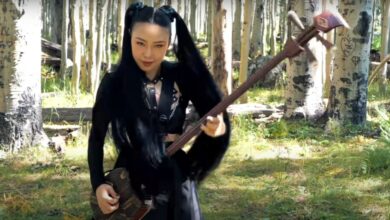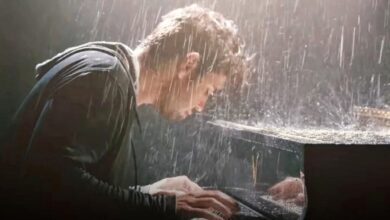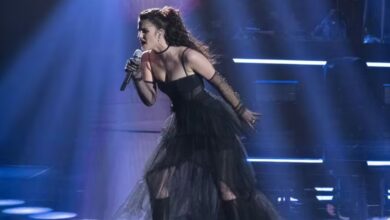A New Generation Surprises Ozzy with a Joyful “Crazy Train” Tribute
When the Louisville Leopards Percussionists—a children’s ensemble from Kentucky—took on Ozzy Osbourne’s “Crazy Train,” they delivered something far beyond a simple cover. Their vibrant, percussion-driven performance featured dozens of young musicians playing xylophones, marimbas, drums, and more, recreating the classic riff with uncanny precision and joyous energy. The video quickly became a viral sensation for its sheer creativity and musicality, capturing the song’s spirit in a fresh and vibrant form.
This unforgettable rendition eventually caught the attention of Ozzy and his family. In a 2018 episode of Ozzy & Jack’s World Detour, Jack Osbourne arranged a surprise orchestrated by his sister Kelly: Ozzy, Jack, and Kelly walked into a school performance where the Leopards played “Crazy Train” live for them, unannounced. Ozzy’s reaction—switching from his usual rock persona to one of sheer delight—was priceless.
During the show, the children performed the piece with enthusiasm and precision, and when Ozzy realized what was happening, he exclaimed, “What the fuck is this?!” before embracing the surprise. It was a heartwarming moment that showcased the softer, more genuinely touched side of Ozzy Osbourne. The interaction was later reported by Metal Sucks and Rock and Roll Garage, confirming Ozzy’s generous response, which included a $10,000 donation to the music program behind the ensemble.
Ozzy’s passing on July 22, 2025, at age 76 cast new light on this clip. What had once been a feel-good segment now takes on deeper significance—an example of Ozzy’s lifelong love of music, his warmth toward fans (no matter their age), and his support for young talent. As fans mourn his loss, the joy he showed in that moment offers a bittersweet reminder of how he bridged generations through sound.
“Crazy Train,” released in 1980 as a solo single, became one of Ozzy’s signature songs—an anthem of defiance, speed, and memorable melody. That such a driving rock anthem could be translated into a percussion ensemble by children and still retain its power is a testament to its enduring composition—and to Ozzy’s impact.
The Louisville Leopards Percussionists were founded as a nonprofit to bring music education to young students. Their appearance on Ozzy & Jack’s World Detour and the continued viral success of their covers show how music programs like theirs can foster creativity and opportunity. Ozzy’s generous response and support highlighted his belief in the importance of music education.
This performance also underscored Ozzy’s personal humility. Though known for wild stage antics and legendary stories, Kelly Osbourne told interviewers that the kids surprised him just as much as the audience. Ozzy transitioned from being a rock god to a genuinely moved observer in the same beat—evidence of how deeply he cared about his music and its legacy.
In light of his passing, the video is now seen as emblematic of Ozzy’s humanity—his willingness to be surprised, to be vulnerable, and to celebrate others. Fans on X, Instagram, and Facebook reflect on how the performance reminds them that Ozzy wasn’t just an icon—he was a mentor and a generous spirit.
Music critics and rock historians point to that episode as a rare crossover moment between heavy metal’s foundation and music education. The boys and girls of the Leopards weren’t just playing a familar tune—they were carrying forward Ozzy’s message: creativity isn’t limited by age, genre, or expectation.
For many viewers, the memory of seeing children enthusiastically play a metal classic for the man who made it famous has become one of the most touching and memorable scenes in Ozzy’s television legacy. That support and moment of joy have now been woven into the fabric of what his impact truly represented.
Ozzy’s family, too, responded reverently when the video resurfaced after his passing. Kelly Osbourne reposted clips on her social media, adding heartfelt captions about what that day meant to them and how much it reflected her dad’s nature—the performer, the father, the fan.
Beyond sentimentality, educators and musicians have used the video as inspiration. Community orchestras and school bands now attempt their own covers of “Crazy Train,” and many cite the Leopards as proof that rock can live in unexpected places, taught to new learners, and enjoyed across generations.
Reflecting on Ozzy’s legacy in 2025, commentators emphasize that this moment isn’t just another tribute clip—it encapsulates the bridge Ozzy built between raw music and real emotion, between loud riffs and quiet support, between superstar status and simple kindness.
In the final analysis, the Leopard’s performance of “Crazy Train” and Ozzy’s reaction to it offer more lasting meaning now than ever. They show that even at the height of his fame, Ozzy was still open to surprise and still capable of awe—a reminder that true legends never outgrow an honest moment of wonder.
With Ozzy gone, the world has lost an irreplaceable voice. But the echoes remain—not just in the steel strings and lyrics, but in the laughter of kids playing his riffs, in the surprise he felt when they shared it, and in the legacy that continues rolling on like a crazy train.





